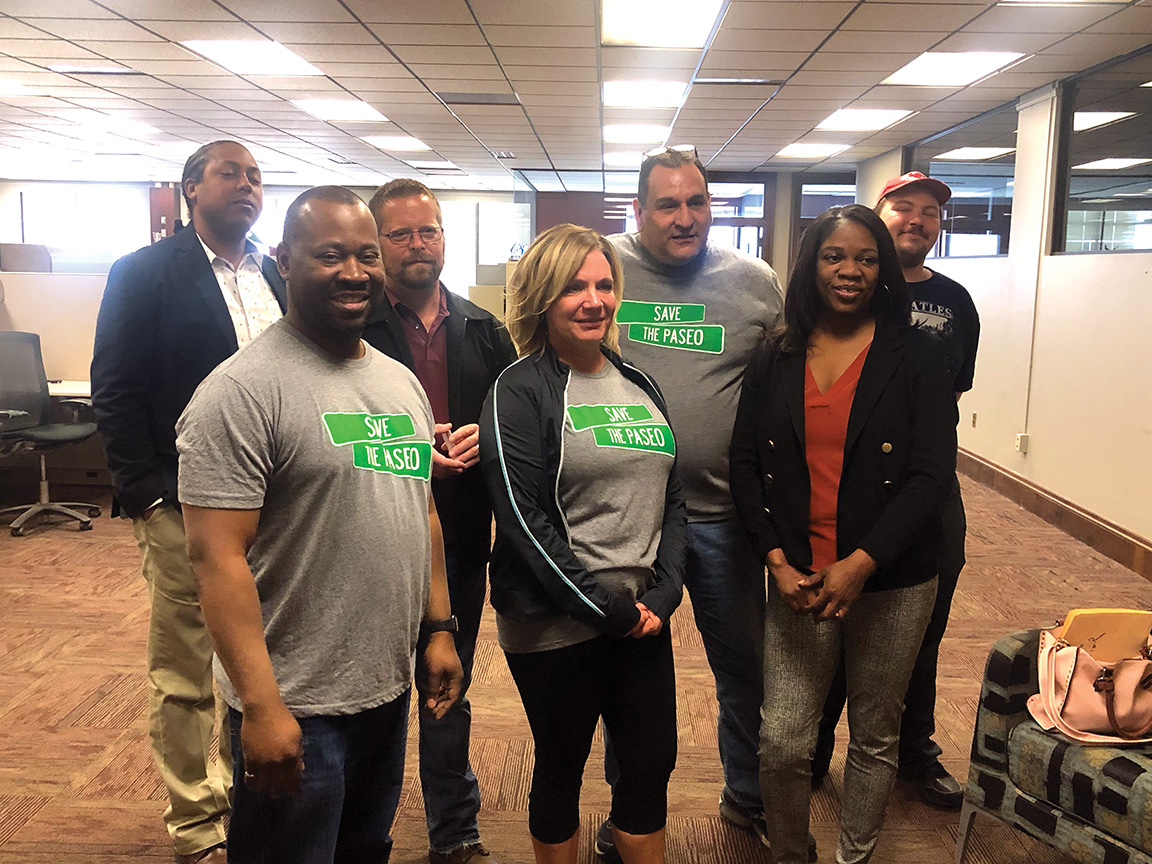Elizabeth Orosco
Northeast News
Public testimony was heard Wednesday, May 22 at City Hall to discuss an ordinance that seeks to change the name of Dr. Martin Luther King Jr. Boulevard back to The Paseo.
Several community members stood before council members to defend the ordinance, citing the need for historical preservation, the frustration with the process among City Council, and the Hispanic roots behind The Paseo.
Since the contentious legislative session of Kansas City’s City Council on January 26, 2019, which saw the passage of Ordinance No. 180828, changing the name of The Paseo to Dr. Martin Luther King Jr. Blvd, the Save The Paseo group, grass roots community activists, have been working to have the controversial name change put in front of voters city-wide.
Friday, April 26, a group of Save the Paseo petition gatherers filed a petition to change the name back to The Paseo.
Chief Deputy City Clerk Kelly Varner counted up and time-stamped 359 pages, totaling 2,857 signatures, and gave the group a dated Certificate of Receipt.
The signatures were sent to four election boards to verify valid signatures. Of the total signatures filed, 2,450 signatures were validated, 742 signatures over the 1,708 minimum.
Crews have recently finished changing over 200 signs along the boulevard to Dr. Martin Luther King Jr. Boulevard.
During public testimony, Diane Euston, local historian and writer in Kansas City, discussed the history of the boulevard and its creator, German-born architect George Kessler.
Kessler, landscape architect, completed over 200 projects and prepared plans for 26 communities, 26 park and boulevard systems, 49 parks, 46 estates and residences, and 26 schools. His projects can be found in 23 states and 100 cities.
“To be clear, Kansas City, with the heart of the boulevard system being The Paseo, was Kessler’s most incredible creation,” Euston said.
Euston read a quote from Cydney Millstein, architectural historian of Architectural & Historical Research, LLC, who the city contracted in 2014 to seek a listing in the National Register.
“The Paseo, along with the historic resources named in the district, formed the nucleus of the system that shaped Kansas City over the ensuing years. The Paseo is a part of an armature of green spaces that defines the district, intertwined with the urban landscape that remains a legacy of Kansas City’s parks and boulevard system. Given the historic significance of this boulevard, it might be better to assign Dr. King’s name to a street indicative of the racial divide west to east that still defines our city.”
Laura Sanchez, a resident who has lived in Kansas City for over 18 years and who has owned a home on now Dr. Martin Luther King Jr. Boulevard for 11 years, discussed her personal connection with The Paseo as a Latina woman.
“I admired the historical significance of The Paseo and I held a special place in my heart for The Paseo as a Latina woman. As a Latina property owner, who has now lived on The Paseo for 11 years, my community identity has been stolen from me. One of the key reasons I chose to live where I do has been taken from me. A historic boulevard with Latin history has been erased.”
Sanchez said she went door-to-door along the boulevard to collect signatures and speak with residents who share her same frustrations.
“Most of the people I spoke with in the 14-block stretch from 68th to 75th Street signed the petition and all of them were angry. Angry that their voices were not heard. Angry that they will have to cover the cost to update their address on their licenses, their home deeds, wills, TSA approvals and other legal documents. I, too, am angry and frustrated… This is about following the correct process and truly representing the concerns of those of us who have chosen to live and own businesses on The Paseo for years.
Sanchez said her goal in addressing the council was to defend the ordinance as a person of color.
“I wanted to make sure my neighbors’ voices, fellow people of color, would be heard along with mine… I came to you today so you can see and hear from another person of color and to reinforce that this is a fair process issue. This is an opportunity for you to model to the nation how to truly represent your constituents, how to correct an injustice, and how to honor and exemplify the legacy of MLK.”
John Bordeau, Pendleton Heights neighborhood resident in the Historic Northeast, also addressed council members.
“I believe in historic preservation and I am also a member of the Northeast Kansas City Historical Society,” he said. “I believe that it is a historic and unique asset to the city that we have a responsibility to preserve. It isn’t ours to change because it doesn’t belong to just us. It belongs to all the citizens who came before us, and it belongs to all the citizens who are going to come after us. I believe we have a responsibility to preserve it.”
Tara Green, who owns a home on Dr. Martin Luther King Jr. Boulevard that was built in 1897, discussed her personal investment in her home and community.
“It is significant to note that to undertake the restoration of a property like this for the preservation of a historic home in a blighted neighborhood is done so literally by our own sweat, blood, tears, and finances,” she said. “You have to care very deeply about the preservation of a community and its history to invest yourself financially and emotionally into its revitalization. We, the people who live, work, and invest in the community are the ones doing this home by home, business by business, and stone by stone.”
Cheryl Barnes, president of the Blue Hills Neighborhood Association said no one came to her neighborhood meetings to discuss changing the name of the street that is the western border of her neighborhood.
“This is one of the true, iconic, and very valuable resources we have on the east side of Troost and we think it should stay The Paseo. It was a flawed process.”
Ordinance No. 190410, changing the name of Dr. Martin Luther King Jr. Boulevard back to The Paseo, will be heard at the legislative session at City Hall on Thursday, June 6.




















